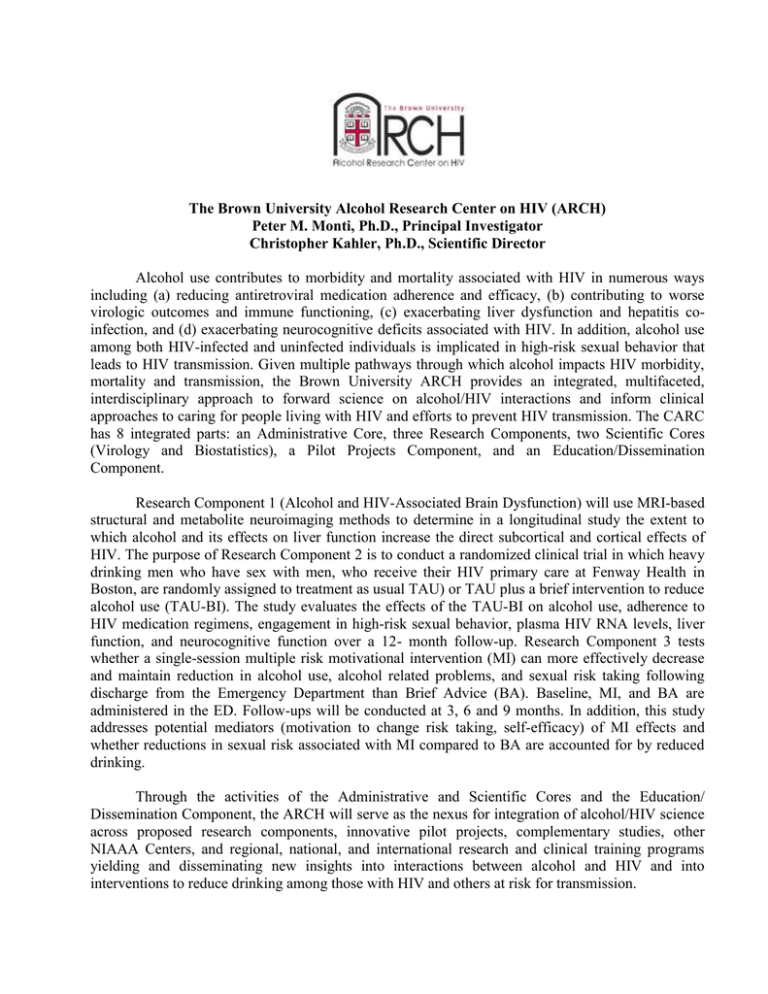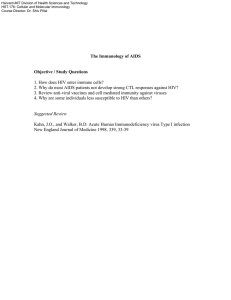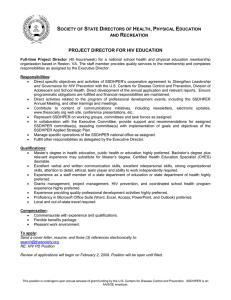Brown University Alcohol Research Center on HIV_2013
advertisement

The Brown University Alcohol Research Center on HIV (ARCH) Peter M. Monti, Ph.D., Principal Investigator Christopher Kahler, Ph.D., Scientific Director Alcohol use contributes to morbidity and mortality associated with HIV in numerous ways including (a) reducing antiretroviral medication adherence and efficacy, (b) contributing to worse virologic outcomes and immune functioning, (c) exacerbating liver dysfunction and hepatitis coinfection, and (d) exacerbating neurocognitive deficits associated with HIV. In addition, alcohol use among both HIV-infected and uninfected individuals is implicated in high-risk sexual behavior that leads to HIV transmission. Given multiple pathways through which alcohol impacts HIV morbidity, mortality and transmission, the Brown University ARCH provides an integrated, multifaceted, interdisciplinary approach to forward science on alcohol/HIV interactions and inform clinical approaches to caring for people living with HIV and efforts to prevent HIV transmission. The CARC has 8 integrated parts: an Administrative Core, three Research Components, two Scientific Cores (Virology and Biostatistics), a Pilot Projects Component, and an Education/Dissemination Component. Research Component 1 (Alcohol and HIV-Associated Brain Dysfunction) will use MRI-based structural and metabolite neuroimaging methods to determine in a longitudinal study the extent to which alcohol and its effects on liver function increase the direct subcortical and cortical effects of HIV. The purpose of Research Component 2 is to conduct a randomized clinical trial in which heavy drinking men who have sex with men, who receive their HIV primary care at Fenway Health in Boston, are randomly assigned to treatment as usual TAU) or TAU plus a brief intervention to reduce alcohol use (TAU-BI). The study evaluates the effects of the TAU-BI on alcohol use, adherence to HIV medication regimens, engagement in high-risk sexual behavior, plasma HIV RNA levels, liver function, and neurocognitive function over a 12- month follow-up. Research Component 3 tests whether a single-session multiple risk motivational intervention (MI) can more effectively decrease and maintain reduction in alcohol use, alcohol related problems, and sexual risk taking following discharge from the Emergency Department than Brief Advice (BA). Baseline, MI, and BA are administered in the ED. Follow-ups will be conducted at 3, 6 and 9 months. In addition, this study addresses potential mediators (motivation to change risk taking, self-efficacy) of MI effects and whether reductions in sexual risk associated with MI compared to BA are accounted for by reduced drinking. Through the activities of the Administrative and Scientific Cores and the Education/ Dissemination Component, the ARCH will serve as the nexus for integration of alcohol/HIV science across proposed research components, innovative pilot projects, complementary studies, other NIAAA Centers, and regional, national, and international research and clinical training programs yielding and disseminating new insights into interactions between alcohol and HIV and into interventions to reduce drinking among those with HIV and others at risk for transmission.


